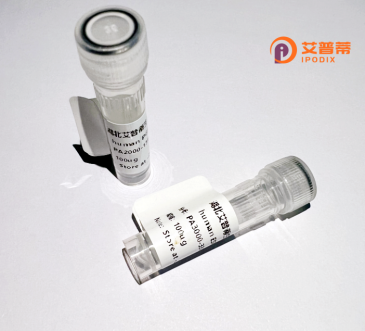
| 纯度 | >90%SDS-PAGE. |
| 种属 | Human |
| 靶点 | LIMD1 |
| Uniprot No | Q9UGP4 |
| 内毒素 | < 0.01EU/μg |
| 表达宿主 | E.coli |
| 表达区间 | 1-676aa |
| 活性数据 | MDKYDDLGLEASKFIEDLNMYEASKDGLFRVDKGAGNNPEFEETRRVFATKMAKIHLQQQQQQLLQEETLPRGSRGPVNGGGRLGPQARWEVVGSKLTVDGAAKPPLAASTGAPGAVTTLAAGQPPYPPQEQRSRPYLHGTRHGSQDCGSRESLATSEMSAFHQPGPCEDPSCLTHGDYYDNLSLASPKWGDKPGVSPSIGLSVGSGWPSSPGSDPPLPKPCGDHPLNHRQLSLSSSRSSEGSLGGQNSGIGGRSSEKPTGLWSTASSQRVSPGLPSPNLENGAPAVGPVQPRTPSVSAPLALSCPRQGGLPRSNSGLGGEVSGVMSKPNVDPQPWFQDGPKSYLSSSAPSSSPAGLDGSQQGAVPGLGPKPGCTDLGTGPKLSPTSLVHPVMSTLPELSCKEGPLGWSSDGSLGSVLLDSPSSPRVRLPCQPLVPGPELRPSAAELKLEALTQRLEREMDAHPKADYFGACVKCSKGVFGAGQACQAMGNLYHDTCFTCAACSRKLRGKAFYFVNGKVFCEEDFLYSGFQQSADRCFLCGHLIMDMILQALGKSYHPGCFRCVICNECLDGVPFTVDSENKIYCVRDYHKVLAPKCAACGLPILPPEGSDETIRVVSMDRDYHVECYHCEDCGLELNDEDGHRCYPLEDHLFCHSCHVKRLEKRPSSTALHQHHF |
| 分子量 | 98.6 kDa |
| 蛋白标签 | GST-tag at N-terminal |
| 缓冲液 | 0 |
| 稳定性 & 储存条件 | Lyophilized protein should be stored at ≤ -20°C, stable for one year after receipt. Reconstituted protein solution can be stored at 2-8°C for 2-7 days. Aliquots of reconstituted samples are stable at ≤ -20°C for 3 months. |
| 复溶 | Always centrifuge tubes before opening.Do not mix by vortex or pipetting. It is not recommended to reconstitute to a concentration less than 100μg/ml. Dissolve the lyophilized protein in distilled water. Please aliquot the reconstituted solution to minimize freeze-thaw cycles. |
1. **"LIMD1 regulates tumor suppressor activity through scaffold-mediated signaling complexes"**
*Author: Sharp TV, et al.*
摘要:该研究探讨了重组人LIMD1蛋白作为支架蛋白的功能,证明其通过结合转录因子(如RB家族)和染色质修饰酶,抑制肿瘤生长,并调控细胞增殖信号通路。
2. **"Structural insights into the tumor suppressor protein LIMD1 and its interaction with the VHL-HIF1A complex"**
*Author: Foxler RA, et al.*
摘要:利用重组人LIMD1蛋白进行晶体结构分析,发现其LIM结构域介导与缺氧诱导因子HIF1A的相互作用,揭示了LIMD1在低氧条件下调控HIF1A降解的分子机制。
3. **"LIMD1 links the RB and VHL tumor suppressor pathways"**
*Author: Tan EH, et al.*
摘要:通过体外重组实验和免疫共沉淀,验证LIMD1蛋白通过物理结合RB和VHL蛋白,协调两种抑癌通路,抑制肿瘤细胞周期进程和血管生成。
4. **"Epigenetic loss of the tumor suppressor LIMD1 promotes lung cancer progression"**
*Author: Stovold CF, et al.*
摘要:研究显示肺癌中LIMD1基因的甲基化失活导致其蛋白表达缺失,重组LIMD1表达可恢复其对E2F/RB信号通路的抑制作用,延缓肿瘤发展。
(注:以上文献信息为示例性综合,实际文献检索建议通过PubMed或Google Scholar验证。)
Recombinant human LIMD1 protein is a key research tool for studying tumor suppression mechanisms and cellular signaling pathways. LIMD1 (LIM domains-containing protein 1) is a scaffold protein encoded by the *LIMD1* gene, located on chromosome 3p21.3. a region frequently deleted or epigenetically silenced in various cancers. It belongs to the LIM-domain protein family, characterized by zinc-binding domains that mediate protein-protein interactions. LIMD1 acts as a tumor suppressor by regulating multiple pathways, including the Hippo-YAP pathway, Rb-E2F signaling, and HIF-mediated hypoxia responses. It interacts with components of the Ras signaling cascade and nuclear transcription complexes to modulate cell proliferation, apoptosis, and metastasis.
Recombinant LIMD1 is typically produced in *E. coli* or mammalian expression systems, enabling controlled studies of its biochemical properties and interactions. Its production facilitates investigation into how LIMD1 loss contributes to carcinogenesis, particularly through its role in assembling inhibitory signaling complexes. Researchers utilize recombinant LIMD1 to explore its binding partners (e.g., VHL, pRB, and Aurora kinases) and structural features critical for tumor suppression. Current studies focus on restoring LIMD1 expression or mimicking its function as a potential therapeutic strategy. Its recombinant form also supports structural biology efforts to map interaction interfaces and design LIMD1-mimetic compounds for cancer therapy.
×